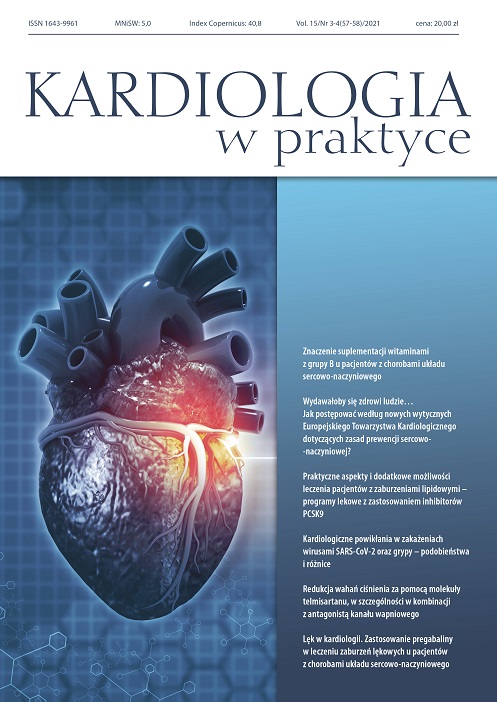Practical aspects and additional treatment options patients with lipid disorders – drug programs using PCSK9 inhibitors Review article
Main Article Content
Abstract
PCSK9 inhibitors are monoclonal antibodies against PCSK9, i.e. subtilisin/kexin type 9 proprotein convertase. These drugs have a high potential to reduce LDL cholesterol and are particularly useful as part of a combination therapy, triple drug therapy with statins and ezetimibe. PCSK9 inhibitors are drugs recommended in the guidelines of the European Society of Cardiology. Currently, in Poland, we have an ever wider panel of lipid-lowering drugs. A possible therapeutic option is the drug program of the National Health Fund for the treatment of lipid disorders with PCSK9 inhibitors.
Downloads
Article Details

This work is licensed under a Creative Commons Attribution-NonCommercial-NoDerivatives 4.0 International License.
Copyright: © Medical Education sp. z o.o. This is an Open Access article distributed under the terms of the Attribution-NonCommercial 4.0 International (CC BY-NC 4.0). License (https://creativecommons.org/licenses/by-nc/4.0/), allowing third parties to copy and redistribute the material in any medium or format and to remix, transform, and build upon the material, provided the original work is properly cited and states its license.
Address reprint requests to: Medical Education, Marcin Kuźma (marcin.kuzma@mededu.pl)
References
2. Schwartz GG, Steg PG, Szarek M et al. ODYSSEY OUTCOMES Committees and Investigators. Alirocumab and Cardiovascular Outcomes after Acute Coronary Syndrome. N Engl J Med. 2018; 379: 2097-107.
3. Cho L, Rocco M, Colquhoun D et al. Clinical Profile of Statin Intolerance in the Phase 3 GAUSS-2 Study. Cardiovasc Drugs Ther. 2016; 30: 297-304.
4. Visseren FLJ, Mach F, Smulders YM et al. 2021 ESC Guidelines on cardiovascular disease prevention in clinical practice. Eur Heart J. 2021; 42: 3227-337. http://doi.org/10.1093/eurheartj/ehab484.
5. Knuuti J, Wijns W, Saraste A et al. 2019 ESC Guidelines for the diagnosis and management of chronic coronary syndromes. Eur Heart J. 2020; 41(3): 407-77. http://doi.org/10.1093/eurheartj/ehz425.
6. Mach F, Baigent C, Catapano AL et al. 2019 ESC/EAS Guidelines for the management of dyslipidaemias: lipid modification to reduce cardiovascular risk. Eur Heart J. 2020; 41(1): 111-88.
7. Giugliano RP, Pedersen TR, Park JG et al. Clinical efficacy and safety of achieving very low LDL‑cholesterol concentrations with the PCSK9 inhibitor evolocumab: a prespecified secondary analysis of the FOURIER trial. Lancet. 2017; 390: 1962-71.
8. Koskinas KC, Windecker S, Pedrazzini G et al. Evolocumab for Early Reduction of LDL Cholesterol Levels in Patients With Acute Coronary Syndromes (EVOPACS). J Am Coll Cardiol. 2019; 74(20): 2452-62.
9. Charytan DM, Sabatine MS, Pedersen TR et al. Efficacy and Safety of Evolocumab in Chronic Kidney Disease in the FOURIER Trial. J Am Coll Cardiol. 2019; 73: 2961-70.
10. Program Lekowy Narodowego Funduszu Zdrowia. (access: 20.10.2021).
11. Glowczynska R, Hus A, Raszeja-Wyszomirska J et al. Are the proprotein convertase subtilisin/kexin type 9 inhibitors new therapeutic chance for patients with familial hypercholesterolaemia and liver failure? Eur Heart J. 2018; 39(27): 2602. http://doi.org/10.1093/eurheartj/ehy361.

